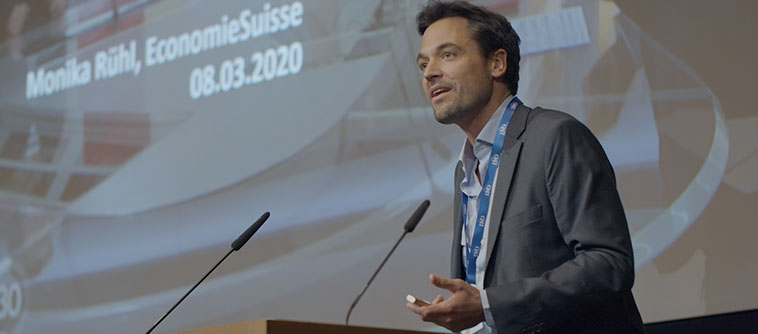In the run-up to the popular vote on Swiss corporate responsibility in November, Enterprise for Society (E4S) – the competence hub which brings together IMD, EPFL and the HEC faculty of the University of Lausanne – has been the driving force behind a roundtable on the subject.
The event, in collaboration with Swiss newspaper Le Temps, took place at the IMD campus on 7 October.
Fostering an economic paradigm that can protect human rights while safeguarding our environmental heritage, the initiative for responsible multinationals continues to be the subject of lively debate in Switzerland.
While there is a general consensus on the relevance of pursuing the objective, opinions regarding the means to achieve it are still split between those who support the project and those who oppose it. The vote will take place on 29 November.
For Alliance Sud, which actively supports the initiative, the Swiss economic framework needs to acquire a preventive tool with a view to making its activities more virtuous.
“The voluntary measures that are currently adopted or proposed are proving insufficient to achieve this,” underlined business and human rights expert Laurent Matile. “Not to mention the unequal competition fostered in a context lacking the rule of law”.
“The way foreigners conduct business shouldn’t be Switzerland’s burden”
“Why should a Swiss company be held accountable for illegal or human-rights violations committed by foreign suppliers who, on their own soil, with the inaction or even complicity of their government, do not respect these fundamental aspects?” asked Cristina Gaggini, the director of economiesuisse from the French-speaking part of Switzerland.
As well as flagging up the problem of liability, she also pointed out how Switzerland and its economic fabric would do well to refuse the vote as it would avoid a whole host of legal obstacles inherent to the initiative.
Perception of the initiative: what does the research say?
The E4S center conducts research on how the role of economic actors is perceived, with a view to encouraging debate and positioning various parties. Research carried out by Anna Jasinenko from the HEC faculty of the University of Lausanne, and Vanina Farber, from IMD, together with colleagues from EPFL, shows that the current pandemic-induced crisis has led to more support of the initiative. This indicates that corporate liability claims have increased as a result of the crisis.
“The COVID-19 crisis has repositioned social issues related to the role of key business players,” said Vanina Farber. “Respect for human rights being at the heart of these issues, the time is ripe to have a discussion about the effects that the adoption of the initiative would have. And this is true whether the consequences turn out to be positive or negative, especially in terms of enlightening the population as much as possible about what is at stake in this vote.”
While most participants in an E4S survey agreed that companies have a responsibility to contribute to the common good, an interesting dynamic has appeared during the pandemic. While opponents seem to be more supportive of the initiative, early supporters now have a less favorable perception of its legitimacy.
However, this negative effect has been much smaller than the positive effect of the change in attitude of opponents. Opinions are less polarized today than at the beginning of the pandemic.
Playing on dogmas
SMEs were well represented during the roundtable. Christophe Barman (pictured), founder of the business services company Loyco, pleaded for the rapid emergence of a progressive model that could get rid of the dogmas that weigh on our perception of the economy.
“In addition to sustainable commitment – which is not an option but an obvious and immediate necessity – it is high time for umbrella organizations and other entrepreneurial firms to better represent the interests and motivations of the current generation,” he said.
“Today’s employees are looking for meaning in what they do. Without this, I am willing to bet that irresponsible economic players will find it increasingly difficult to attract talent to their teams in the near future”.
From soft law to hard law
At the legal level, it seems that the initiative, whether or not it proves complex to implement, is part of a today’s social and political reality, as confirmed by a look at our European neighbors whose projects in the area of corporate social responsibility (CSR) have been multiplying for some time now.
As for the question of controls, if the initiative is accepted, it would seem that “the various solutions and potential applications are still unclear,” said lawyer Julie Wynne of the Froriep law firm.
In the event of rejection, the indirect counter-project developed by the Parliament, would come into effect.



